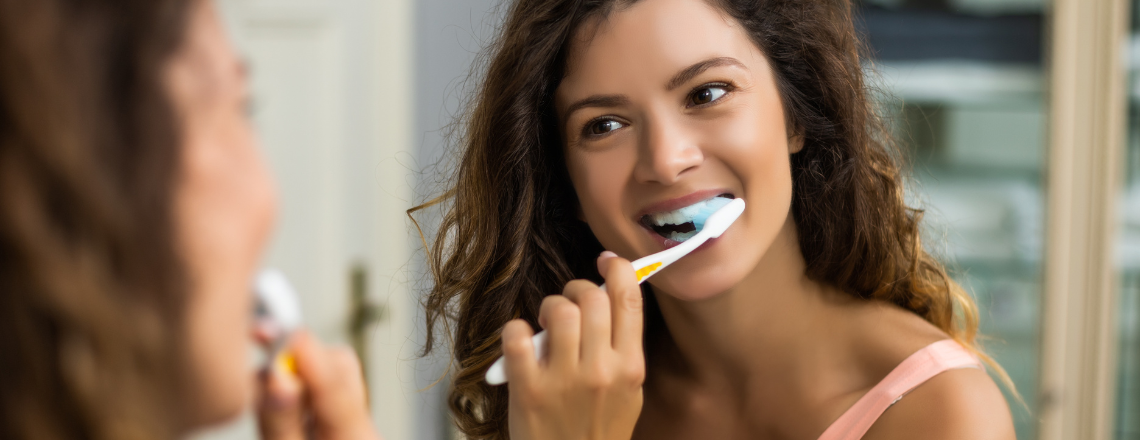Many people try to form better habits while working from home, including eating healthier, working out more, self-reflecting, and more. However, we still have plenty of patients that come in and ask…
I brush my teeth twice a day, so why do I still get cavities?
While the answer to this question is different for everyone, there are still some general principles about cavity formation that I share with my patients that can help address this concern:
- How do cavities form?
- How can you help your teeth re-mineralize?
- When is the best time of day to brush your teeth?
How Do Cavities Form?
All our teeth are made up of minerals. Any time you eat or drink sugary or starchy foods, bacteria in the plaque on your teeth begin to produce acid, then this acid eats away at the enamel (or the protective layer on your teeth). When your mouth drops below a critical pH and becomes more acidic, teeth begin to lose those natural minerals on our teeth.
It takes about 30-60 minutes after eating or drinking for the pH in your mouth to return to normal. However, if you don’t give your mouth enough time to recover after eating or drinking and consume something else high in sugars or starch, the process begins all over again and acid continues to form from the plaque on your teeth.
For example, drinking a can of soda in 10 minutes is much better than sipping it over the course of an hour because your mouth will only be exposed to this acidic beverage for 10 minutes rather than repeatedly for 60 minutes. The sooner your teeth can start the re-mineralizing process, the better.
How Can You Help Your Teeth Re-mineralize?
Saliva is our friend! Saliva is a big help in keeping our teeth protected. It acts as a natural buffer from harmful particles and helps flush them out. The same minerals found in our teeth are also present in saliva, so after you eat, saliva helps add calcium and phosphate back to the teeth.
However, sometimes that’s not enough, and fluoride comes in. By using toothpaste containing fluoride or drinking tap water with fluoride, those helpful properties embed themselves in your saliva and help protect your teeth. As a result, the next time your teeth are recovering from sugar and acid in the juice you drank or cookies you ate, your teeth can use these fluoride minerals embedded in your saliva to create a stronger and more decay-resistant enamel.
When is the Best Time to Brush Your Teeth?
We all know brushing our teeth twice a day is important. But exactly when in the day should we brush?
While you’re sleeping, plaque-causing bacteria are multiplying in your mouth. Brushing your teeth first thing in the morning can be beneficial by removing this plaque and bacteria. Brushing your teeth in the morning also helps because it introduces fluoride into your mouth before you eat your first meal of the day. You can help cleanse your mouth of the bacteria that multiplied overnight, which helps lessen the number of particles that turn to acid from your breakfast!
If you’re one of those who like to brush after a meal, be sure to wait at least 30 minutes before brushing. If you brush immediately after finishing a meal, you may be removing those helpful minerals in your saliva. If you need a rinse after eating, drinking water or chewing sugarless gum can help increase saliva flow so that it can do its job in keeping your teeth healthy.
In addition, making sure you brush before heading to bed at night can limit any prolonged acid exposure while you sleep. In general, it’s plain important to brush twice a day to help remove harmful bacteria and particles from your mouth. However, you can elevate your routine by brushing first thing when you wake up, and last thing before you go to sleep.
If you have questions about your oral health routine—especially during this stressful and unprecedented time—request an appointment below and our teams can help!

